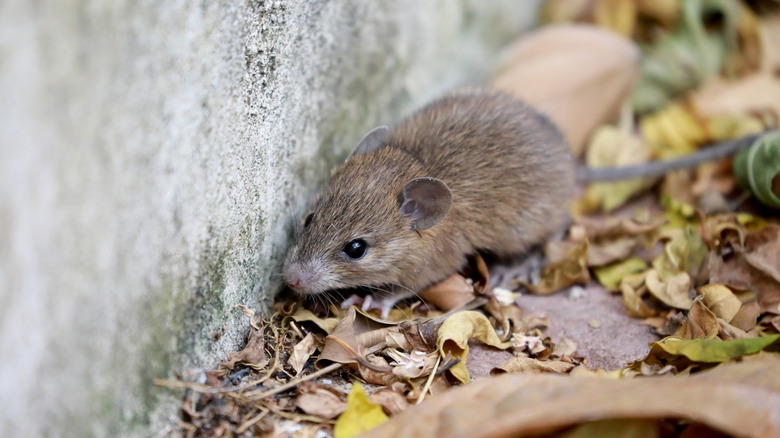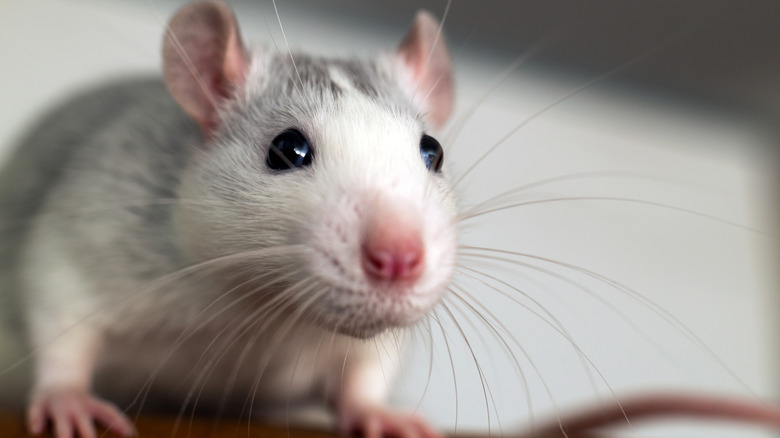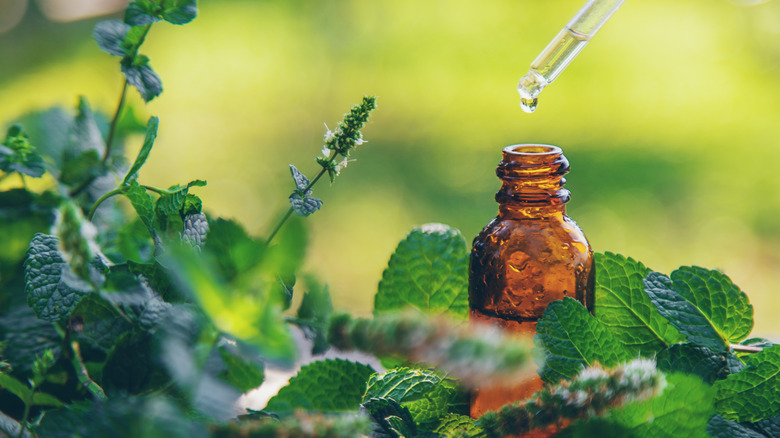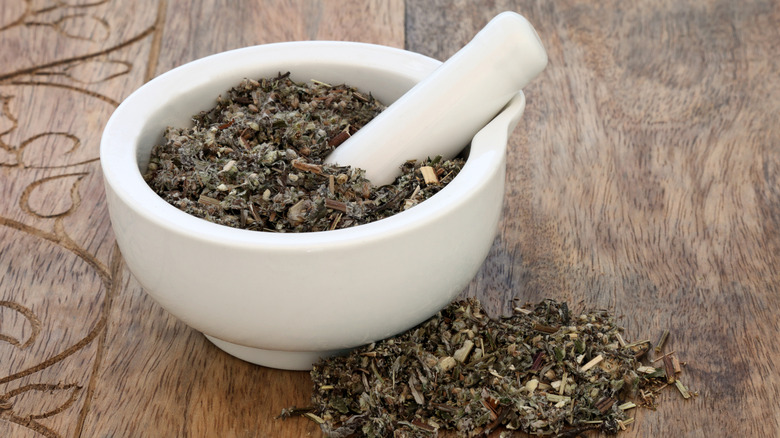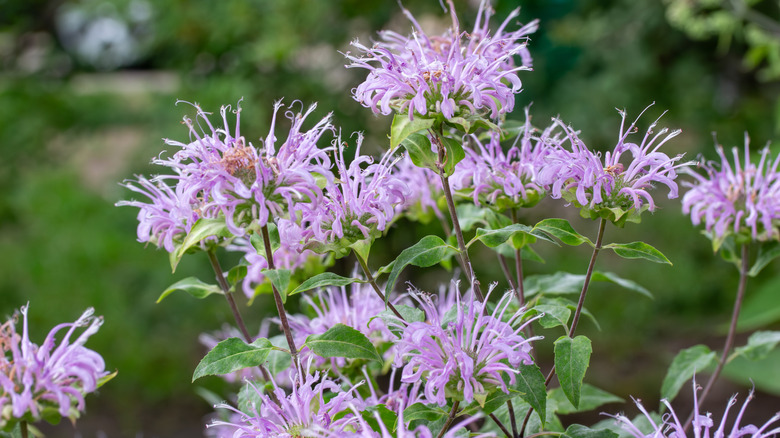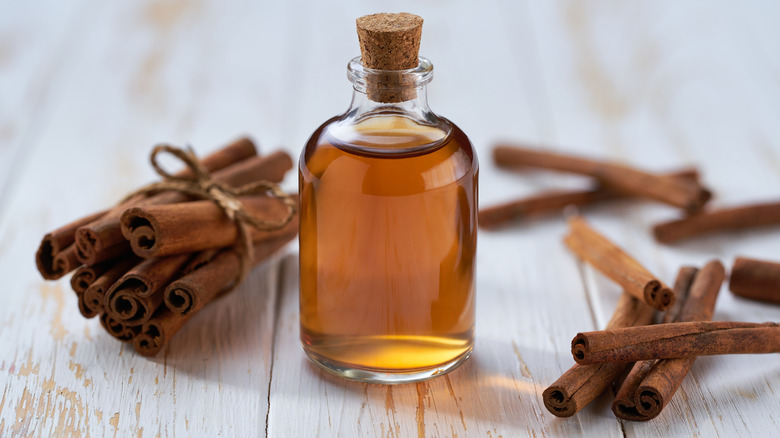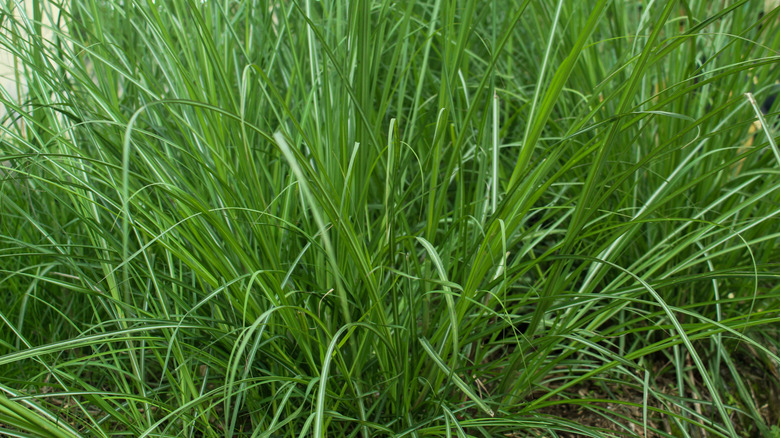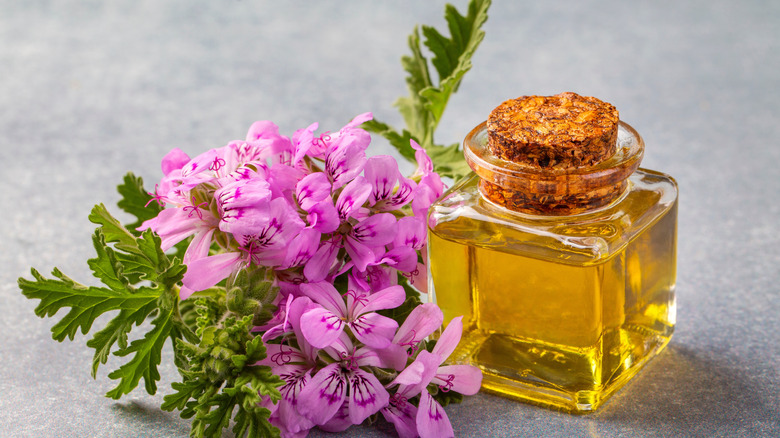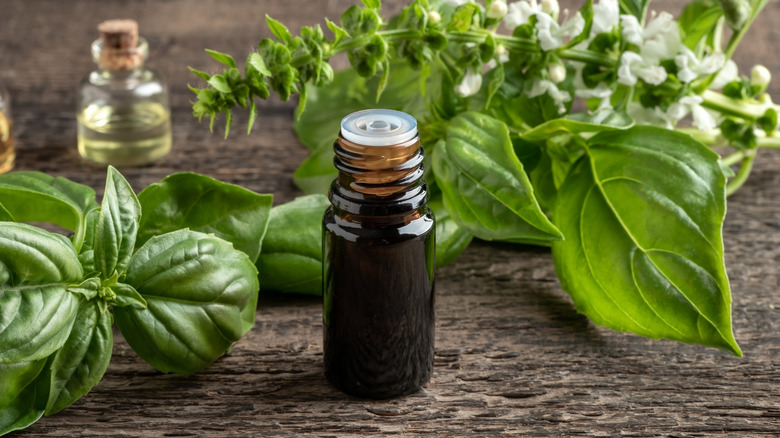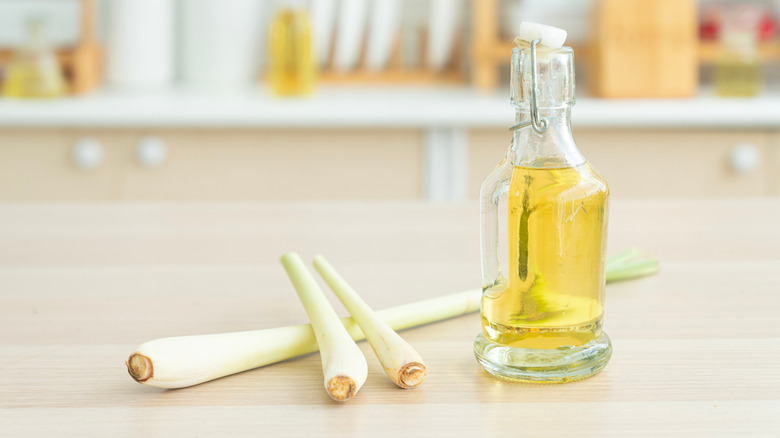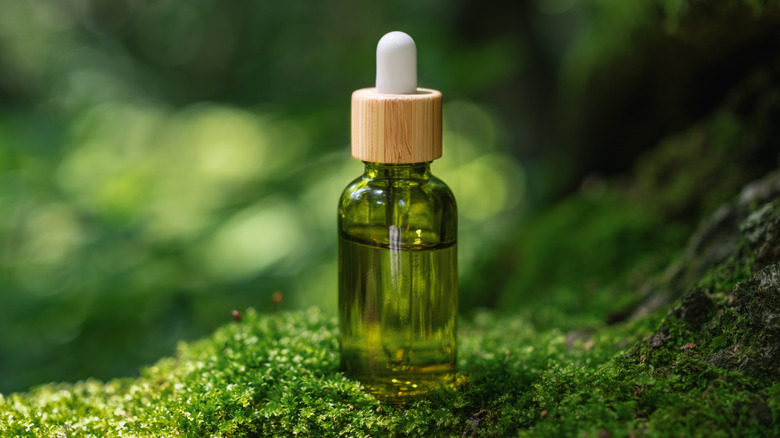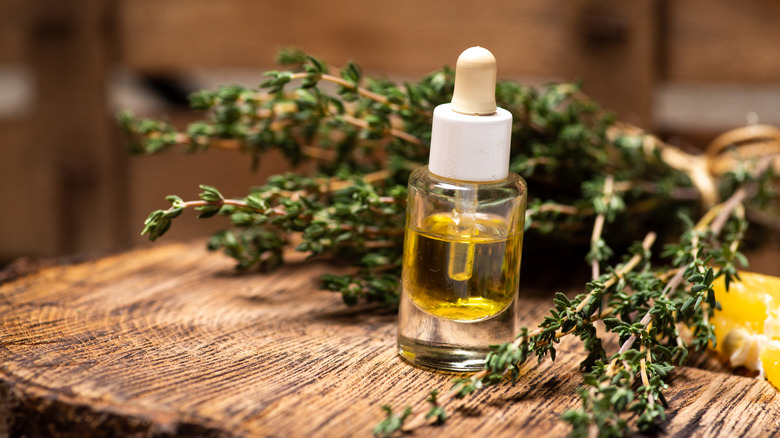Smell-Good Scents That'll Keep Your Home Fresh And Deter Pesky Mice
Some people love having roommates, while others prefer living alone. Whichever team you fall into, you can probably agree that wild mice are unwelcome co-inhabitants. When they're not being kept as pets, mice can be problematic for homeowners as they gnaw wires, leave droppings behind walls, and irritate you with their constant scratching sounds. If only there was a way to put up a "No Trespassing" sign that mice would understand to signify that they aren't welcome in your home. Well, there kind of is!
Mice have an incredibly well-developed sense of smell, and certain scents can send them skittering for the exits. Unfortunately, many of those are smells that come from predator urine, which is probably not the aroma aesthetic you're going for. But thankfully, there are some good-smelling scents that humans love and mice don't, so we've rounded up some of our favorites. Plus, we're going to break down the science behind why these scents deter mice so that you can get the full picture of what's going on and how it works. But don't worry, we're not asking you to join us in Adventures in Advanced Chemistry class — we'll keep it simple and easily digestible.
But one caveat we want to make before going forward: These scents will help repel curious mice scouting for a new nesting spot, but they won't help drive a full-fledged colony of mice away. For that, we advise biting the bullet and calling the exterminator instead. Also, we'd recommend leveraging this list of scents in the form of essential oils, as this is what the research covers, and it's unlikely that a few sprigs of herbs will send mice scampering. Now, let's dive in.
Why do mice hate strong smells?
So, what is it about strong scents that make mice run for the hills? Basically, scents are made of molecules, and some of those molecules are known as monoterpenes. Plants produce monoterpenes to attract pollinators and protect their cells from damage. When we distill plants to make essential oils, these molecules come along too. Studies have shown that some monoterpenes have beneficial effects on humans, acting as antioxidants and anti-inflammatories when absorbed by our membranes.
For mice, monoterpenes can have a sedative effect, reduce their brain's ability to process pain signals, and ameliorate symptoms of anxiety. Much like we need our brains to know not to stick our hands on a hot stove, mice need these sensory functions to alert them to danger. Getting their danger radar lulled by monoterpenes is a problem they'd probably prefer to avoid in a strange, new place (like your house). Since mice have such a well-developed sense of smell, they're very aware of monoterpenes and can detect them down to 0.7 parts per billion (ppb).
Whether mice actively sense that certain smells can make them less receptive to danger signals is unclear. But what is clear is that monoterpenes can have a repellent effect, and spraying a monoterpene-rich essential oil around your home may make mice stay away. In particular, mice are especially sensitive to a few monoterpenes that are commonly found in essential oils: geraniol, eucalyptol (also known as 1,8-Cineole), α-pinene, limonene, citral, linalool, and β-pinene. Going forward, this is how we'll be breaking down why each essential oil is so potent against mice.
Eucalyptus has a repellent effect on rodents
The smell of eucalyptus has been a well-known mouse repellent for years, but why? Turns out it's chocked full of monoterpenes that mice hate. A 2014 study in Scientific World Journal found it to have eucalyptol, limonene, linalool, and α-pinene, amongst others. In the study, researchers found that using eucalyptus essential oil concentrations as low as 5% had a positive effect on deterring rodents from food sources. Since it's one of the relatively cheaper essential oils on the market, it's one of our top candidates for the best essential oil to deter mice from your home.
However, eucalyptus essential oil is considered toxic and can be fatal if ingested by humans or animals even at low dosages, so it should be put somewhere that tiny hands or paws can't knock it over. One of the ways that you can use eucalyptus oil safely is by adding it to a diffuser or by creating a spray by diluting it in water and spritzing your room. Just be sure to give it a good shake first since oil and water won't blend on their own.
Peppermint has a two-pronged mouse repellent approach
Peppermint essential oil is like a one-two punch of mouse-deterring benefits. A 2023 study in Molecules found it contained lots of rodent-repelling monoterpenes – α-pinene, β-pinene, and limonene, in particular. In addition, its scent is so strong that it can overload the rodents' scent receptors, masking the smell of any potential food sources they might find in your home.
Peppermint essential oil is easy to find in most natural grocery stores or aromatherapy aisles but can be fatal to humans if ingested and is considered toxic to pets by the ASPCA. So, it should be kept out of their reach. You can use peppermint essential oil around your home in diffusers or by soaking a cotton ball in the oil and swiping it around baseboards or places where mice might get into the walls. Remember that this is a potent-smelling oil, and if it's a little too intense for your nostrils, you can dilute it in a carrier oil like olive or sunflower.
Artemesia has been used for years to repel mice
You may not be familiar with the name "Artemisia" unless you're from the plant family's native region of Turkey and Armenia, but might instead know it as wormwood, one of the main ingredients of absinthe. Regardless of the name, the leaves and oils of Artemisia plants have been used by villagers of its native region to repel pests of all kinds, including rodents and mites. Two studies, a 2005 one in Flavour and Fragrance Journal and a 2024 one in Plants, found the oil contained anywhere from 22.8% to 23.7% 1,8-cineole, one of the most potent mouse-repelling monoterpenes around.
The scent of plants in the Artemisia family range from sweet to medicinal, depending on the species and your sense of smell. It might be a favorite or might be too much for your preferences, so start with a little and see how it goes. Typically, Artemisia is not considered toxic, but it can cause allergic reactions in people with asthma or sensitivities to flowers in the daisy family. You can use it in a spray or on a cotton swab, spritzing or swabbing around areas where mice might get into the home.
Bergamot smells divine and is a strong mouse repeller
In our opinion, bergamot might be the ultimate good-smelling scent for the home that mice hate. A 2017 study in Environmental Science Pollution and Research analyzed bergamot oil's efficacy and found it was composed of a whopping 39% limonene, 12.5% linalool, and 8.6% of other monoterpenes that mice hate. So it's probably no surprise that of all essential oils tested in the study, bergamot was found to be the most effective in repelling rodents from food sources.
Bergamot's scent profile is heavenly; it's a light citrus scent that's just a little bit floral. Unfortunately, it's probably one of the more expensive oils listed here, so you may want to dilute it in a carrier oil to get more bang for your buck. The FDA considers it to be safe for humans, but the ASPCA warns it could be toxic to pets, so use it with caution. Try it in a room diffuser, spray, or add it to your cleaners and reap its antimicrobial properties.
Cinnamon is an effective mouse deterrent
You're probably not surprised to see cinnamon on this list as it's been touted as a rodent repellent everywhere. But we wanted to know why it was so effective as a mouse deterrent, so we dug deep into the research to see what we could turn up. As it turns out, one of the main compounds in cinnamon bark oil, cinnamaldehyde, is so toxic that a 1994 study published in Food and Chemical Toxicology noted a 100% mortality rate for rats force-fed it. In addition, researchers have used cinnamic acid as a basis for cinnamamide, a synthetic compound that has immense promise for repelling rodents from food sources like homes. In addition, a 2023 study published in the Bulletin of the National Research Centre listed both cinnamic acid and cinnamamide as recommended repellents for house mice (Mus musculus) and other rodents.
Both the ASPCA and FDA consider cinnamon oil to be safe and non-toxic so you may be more comfortable using this around your home if you've got small kiddos or pets. There are lots of ways to use cinnamon essential oil around the home, but adding it to your household cleaners may do double duty. This allows you to easily coat surfaces with a known mouse repellent while also adding a bit of antibacterial boost to your multi-surface spray.
Palmarosa's lemony scent is a smell mice can't stand
Palmarosa isn't as well known as other essential oils on this list, but it really should be. Not only is its scent profile lemony-fresh, but a 2003 study in Phytochemistry found its oil's chemical makeup is 65% geraniol, the monoterpene mice are very sensitive to. A 2018 study in the Journal of Stored Products Research tested baits coated with low concentrations of palmarosa oil to see if mice would be deterred from the food. It turns out that the higher the concentration, the more effective the oil was in keeping mice from eating.
Palmarosa oil is considered non-toxic, but its high geraniol content can irritate people with sensitive skin. So, folks with kids or small pets may want to use it up high or in an oil diffuser. Its aroma is lemony but sweet, like a candy, so it blends nicely with other citrus scents.
Chinese geranium is a powerful mouse deterrent
Chinese geranium is another oil that's great for repelling a number of rodents. The 2023 study listed above mentions Chinese geranium as one of the more effective oils for repelling not just mice, but voles, rats, woodchucks, and squirrels. A 2019 study published in Essential Oil Research found that the geranium family of plants, Geraniaceae, contained anywhere from 50% to 70% geraniol, linalool, citronellol, and their related esters. Essentially, the smell you get from geranium oil is made up of a majority of mouse-repelling monoterpenes.
While the FDA considers geranium oil to be safe for humans, the ASPCA warns that the actual plant is toxic to pets, so it stands to reason the oil would be, too. Its scent profile is deliciously floral, but it's definitely more on the expensive side than other oils listed here, so you may want to use it in a blend or diluted. Geranium oil is fantastic in an oil diffuser or as a room or linen spray when mixed with water.
Basil oil is used to prevent mice from entering buildings
Oh, basil, how do we love thee? Apparently, not everyone does because rodents, including mice, absolutely hate the smell. Thanks to a 2021 study published in Foods we know why: Its oil is mainly composed of 41.3% linalool and 1,8-cineole comes in at number two with 9.6%. When mice hate the two main components of an essential oil, you know you've found a winner. Basil was also listed in the 2023 study in the Bulletin of the National Research Centre as an effective rodent repellent in grain warehouses, so the hits just keep on coming for mice.
Both the FDA and ASPCA consider basil oil to be safe, so have at it. Basil's scent profile is very distinct and herbal; if you've been to an Italian restaurant, then you've smelled it. In addition to repelling mice, basil can be used for deterring ants naturally. Just mix a few drops with water to create a kitchen-worthy room spray, or soak a cotton ball and leave it somewhere that might become a secret mouse entryway.
Lemongrass is used to deter mice from warehouses and fields
Lemongrass is one of the most effective pest-repelling plants around, so it's no surprise mice hate it, too. The aforementioned 2023 study from the National Research Centre testing cinnamon also lists lemongrass (Cymbopogon spp.) as a useful natural deterrent of rodents that can be used in warehouses storing grains. Lemongrass' main chemical compounds contain multiple mouse-repelling monoterpenes, including two types of citrals, geranial and neral, and a small amount of geraniol.
While the FDA considers lemongrass oil to be safe, the ASPCA warns it could be toxic to pets, so use it with caution if you've got furry friends at home. Its scent profile is very citrusy and herbal, and some consider it to be quite pungent, so you may want to dilute it if you're sensitive to strong aromas. Use the oil as a room spray or in a diffuser, or plant the stalks around the border of your home to reap its many benefits. Just be aware, essential oils are more concentrated than the plant, so you may not get as strong of a repelling response. But then again, creating an aromatic physical barrier of lemongrass around your house could make mice think twice since they'd have to wade through it to find a way in.
Tea tree oil is good for long-term repelling of mice
Tea tree essential oil has lots of benefits but it's a particularly powerful mouse repellent. The aforementioned 2018 study in the Journal of Stored Products Research also tested tea tree oil and found it to be just as effective as palmarosa for deterring mice away from tasty foods. What might make it so effective is that its chemical makeup includes 2% 1,8-cineole, one of the more potent rodent-repelling monoterpenes.
The oil's scent can be strong if you're not used to it and is characterized by a slightly green, medicinal smell. However, if you like it, tea tree oil can be used in your home as a room refresher in an oil diffuser or as a spray. It also pairs nicely with eucalyptus oil, another excellent mouse deterrent. So, you can combine the two and apply it to baseboards or around vulnerable entry points. However, be careful, as tea tree oil can be toxic if ingested.
Thyme is full of compounds that mice hate
Thyme is a versatile plant that makes a great garden ground cover, is tasty, and contains oil potent enough to keep would-be mice stowaways from making a beeline for your home. The 2023 National Research Centre study included thyme in its rodent-repelling tests and noted it was effective for protecting grain storage areas from curious, hungry mice. Thyme oil is made up of multiple rodent-repelling monoterpenes, including linalool and geraniol. However, the 2017 study that tested bergamot also tested thyme and found its main component, thymol, had no effect deterring mice from yummy foods. So, we'd recommend using thyme oil in a blend instead of by itself.
Both the FDA and ASPCA consider thyme oil to be safe for humans and pets, so it can be used around the home without worry. Thyme smells very herbal and fresh, pairing nicely with citrus scents or light florals. Use it in cleaning sprays and oil diffusers, or swab a cotton ball soaked in it around window sills or baseboards to deter mice.
